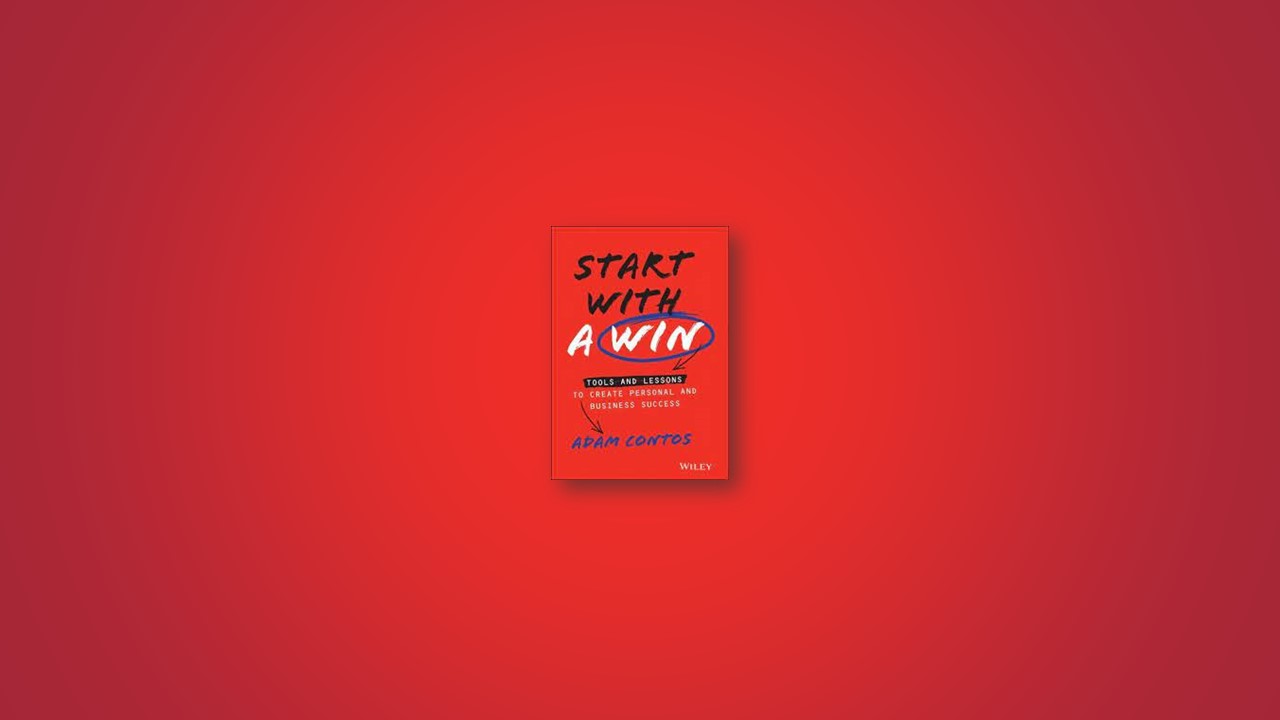YOUR TURN TO FIX THINGS
Your success is up to you. Believe “I can,” and you’re on the way to win No. 1.
A win isn’t dollars and cents or a place or end point. It’s a journey—a series of missions or experiences, and actions—that, done right, brings happiness along the way.
A win is a set of answers to following questions:
- What is the challenge?
- What is the necessary attitude to get started?
- What action or actions are necessary to overcome the challenge?
Locus of control determines the degree to which you feel you have control over your results and ultimately your life.
The most successful people take ownership of outcomes; they exhibit internal locus of control.
Life is a series of missions or experiences that contribute to our playbook for life.
Leaders model the right behavior.
Faced with a business challenge—including generating new business—stop and think about the stressor or the challenge, then determine the solution, and how can you provide it, and then take action.
Everyone thinks there’s a secret to giving a great speech. But there’s not. Approach a presentation as you would any mission or any challenge. What’s the challenge? What are the solutions (your script)? Then prepare (practice), and take action (present).
No matter the type of presentation, people want to see and hear a positive attitude, confidence, and a genuine caring.
Uncertain times call for companies and people to pivot and act quickly to shore up any weaknesses in order to survive and thrive. Those who are slow to react, if they react at all, will falter and often fail to survive.
Pay attention to the language you use in dealing with others. People listen when you use their words and tune out when you use yours.
In business and in life, a holistic approach works best in the pursuit of health, happiness, relationships, and success.
YOUR TOOLBOX FOR THE JOURNEY
The secret to learning more is to live more.
The great wisdom of fails is what we learn from them. The takeaway turns the negative outcome into a positive—a win.
Debriefings are essential, even in a solo mission. Team postmortems that review the victories as well as the shortcomings maximize the lessons learned from a mission.
Follow the four-step look-back process:
Celebrations: What went well? List everything, step by step, that was effective and efficient.
Frustrations: What didn’t go well? List everything that was inefficient, painful, or challenging. And be honest.
Eliminations: Where was money, time, or effort wasted? What could have been done differently? What caused other problems? (Delve more deeply into the challenges. Your answers in turn can help you identify scalability and leverage possibilities.)
Deviations: What other options could have been used? In other words, how might we complete the mission next time? Plan the mission again from the beginning. Ask why, how, and what if, too. Remember, you don’t know what you don’t know, so explore.
Consider the people in the mission. Would the mission have worked better with people in different assignments or with different people? It’s not about ego; it’s about accomplishment.
Entrepreneurship is not about stopping when you fail. It’s not about ego, either. It’s about accomplishment.
When faced with a challenge revert to the tenets of leadership—assess the problem, find the solution, take action, and move forward for the win.
THE FLIP SIDE
Our emotions dominate us through fear and self-doubt and threaten to overshadow all we do.
Harnessing self-doubt is among the greatest strengths we have. Allowing fear to rule our lives is the greatest weakness.
Fear can be deconstructed and defeated. Fear is only as deep as the mind allows.
Appreciation is magic.
When you act with integrity and work in your people’s best interests, you can fail and learn. You can make it through difficulties. People respect your ability not to succeed in everything, and they don’t fault you personally for less-than-successful outcomes.
If you can deconstruct any problem—including fear—you can think it through and prevent overwhelm with action.
Meet fear with love.
Perfection is the enemy of action.
Don’t ever think that if you ignore a problem, it will go away. Just as victories add up to create great positive momentum for a sports team or individual, so do unaddressed problems create their own negative momentum. The more challenges left unattended, the more overwhelmed a person can become, and their performance and decision-making skills decline.
You can train yourself to start with a win by starting with a plan or process, a small commitment, and then moving on to more and more and more.
The more we think we can, the more we can. That’s a trained behavior.
Getting angry or overwhelmed are conscious acts. Overwhelm is the frustration we experience when we try to perform too many conscious acts at once or when we face a seemingly unsolvable challenge. In the face of overwhelm, take time to stop and reset your mind. Then you can simplify the challenge and ultimately accomplish the task.
Problems at work almost never start at work. People who struggle on the job often are upset in their personal lives first. They complain; they are miserable; they have troubles in relationships, and with their health.
SYSTEMS AND KNOWLEDGE
No matter the situation or the circumstance, when we intentionally seek out learning and challenge ourselves, we become better at who we are and what we do, and we come away with a win.
The real value of learning and having great knowledge lies in giving it back—so much so that people notice. The goal isn’t praise or personal recognition; it’s free giving of knowledge without expectations to help others.
Organizations should not tolerate mediocrity. Instead, the goal should be to encourage calculated risk-taking to create smart growth.
To improve your leadership skills, consider teaching a class. The subject doesn’t matter; it’s the process that’s important because teaching is not only telling and training, but also troubleshooting and diagnosing what defines success in a particular situation or action. Leaders do that day in and day out.
In order to sell solutions, you must first give away knowledge to open the door for transaction discussions. Too many businesses fail because they don’t want to give away their best advice; they want to sell it. No one wants to buy your advice until the other free advice works for them.
Faced with extreme challenges, double down on your systems. Those systems are the playbook for life amassed from all your missions.
Emotions are like dominos—one falls and triggers a chain reaction of falling dominos. Keeping a cool head allows a person to focus on the situation and solve the challenge.
GRATITUDE
Mentors understand human nature, leadership, and have experience in your business space. Often that experience includes overcoming extraordinary business and personal challenges.
To find a mentor, look for someone who wants to be available to you. However, you must be available, too. Keep in mind that you cater to the mentor, not the other way around.
Actively look for leaders. These leaders can help you become a better problem-solver and a more impactful leader if you learn their philosophies, observe their trials and tribulations, and emulate what works. It’s all about interactions, emotions, response, and tactics.
Coaches ask questions, give advice, and help you create moments of self-discovery. They do not, however, tell you what to do, but rather point you in a direction. It’s up to you to decide what you’re capable of and then to take action.
Just showing up doesn’t cut it for a mastermind. It takes preparation, determination, and grit. Be sure to ditch your ego at the door, too.
If there is an expert, specialist, or educator you follow or admire, Google their name and “mastermind” to see if they have a mastermind or participate in one.
Be careful when choosing a coach, mentor, or mastermind. Do your homework, look for references and referrals, and make sure the person or group isn’t simply trying to sell you something.
If your business relies on or has relied on investors like venture capitalists, those people or organizations often may be able to suggest a coach, mentor, or mastermind or help you form a mastermind of your own. Colleges and universities may have lists of qualified individuals interested in helping, too.
Too often we overlook the tremendous value third parties can bring to our growth and development and fail to avail ourselves of those opportunities.
Whether you agree with the feedback from coaches, mentors, and masterminds, their input is valuable knowledge.
Express gratitude by saying thanks.
THE RIGHT WAY TO CELEBRATE
Celebrating achievements also is about reinforcing hope—the hope to win again and again and again. Hope, after all, is the energy that fuels wins.
Happy people make noise. They talk, laugh, celebrate, collaborate, and work together for great things. Challenges become discussions that create solutions and wins. Those wins are celebrated, and the cycle continues.
Celebrating the wins demonstrates positive leadership. Teams connect with leaders, who empower and inspire others. That’s compared with management, which rules by the bottom line and numbers.
Restoring a winning culture isn’t an overnight process. A leader must rebuild trust, and that takes time and patience.
Wins are important in a business or team, regardless of the nature of the win, its size, or the style of celebration. Wins by leaders are important to celebrate, too.
Beware of territorialism in your organization. It can tank the wins and eat away at an organization from within.
Think of key performance indicators (KPI) as KPI 2.0, Key People Indicators. Your people tell the real tale of your business’s success or not.
The traditional return on investment (ROI) becomes ROW, Return on Wins. When you the celebrate the wins, you add tailwinds to boost the culture, values, and sentiment of the organization.
Stop to celebrate the accomplishments. Otherwise, you can fall into the trap of expecting the win. Then the win becomes a monotonous task—a burden.


